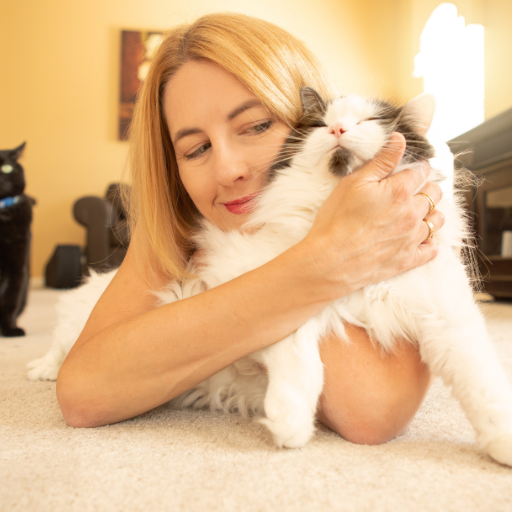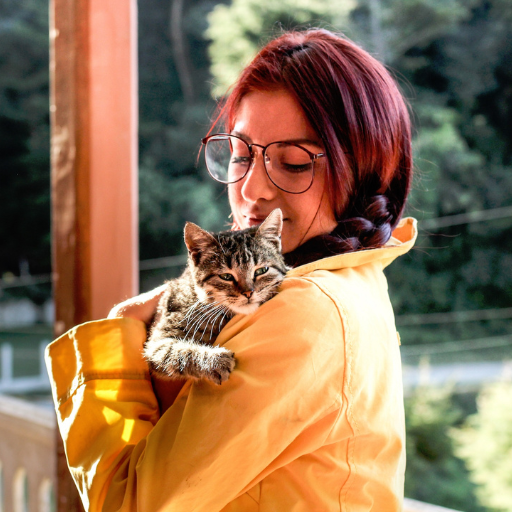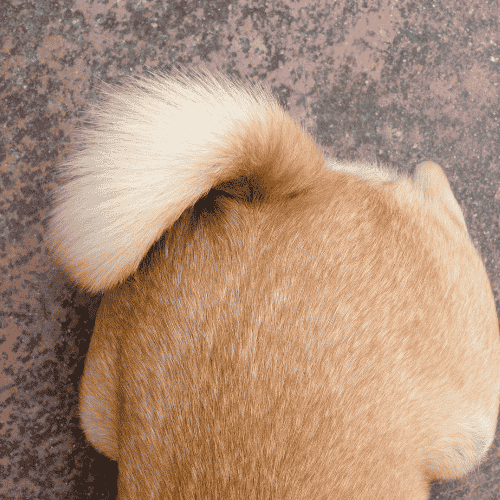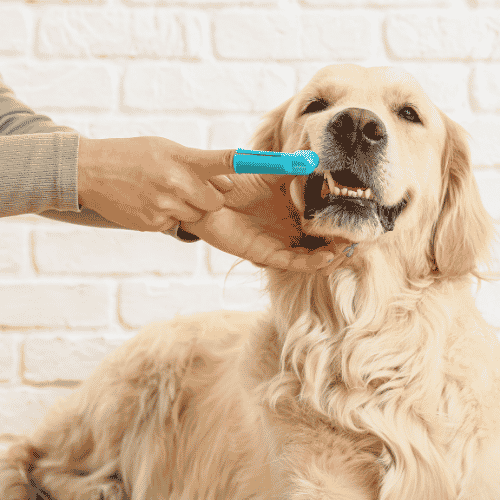Unraveling the Mystery: Why Is My Cat Clingy When I’m on My Period?
Like many women, you may have noticed a peculiar shift in your cat’s behavior during your menstrual cycle. The usually independent feline seems to shadow your every move, seek your lap more frequently, and show heightened affection. This puzzling behavior leaves many pet parents wondering: “Why is my cat clingy when I’m on my period?”

An In-Depth Look at Feline Sensory Perception
Cats, known for their impressive sensory capabilities, boast an olfactory system that vastly surpasses that of humans. With more than 200 million odor sensors in their noses, as opposed to humans’ mere 5 million, cats experience the world in a profoundly different way. This olfactory prowess allows them to recognize people, places, and things by their unique scent signatures.
While cats’ acute sense of smell could feasibly detect changes in body odor during a woman’s menstrual cycle, it is crucial to understand that the connection between menstrual scent and a cat’s behavioral change remains anecdotal and speculative, absent firm scientific evidence.
Examining the Potential Triggers: Hormonal Changes, Stress, and More
Notwithstanding the lack of empirical evidence linking a cat’s clingy behavior with menstruation, several plausible theories have surfaced. For example, it’s posited that cats might sense hormonal fluctuations—like the drop in estrogen levels—occurring during menstruation, and interpret them as changes in their environment. However, cats are not known to comprehend human hormonal cycles, and this theory remains conjectural.
Another theory attributes your cat’s heightened affection to their intuitive perception of your stress or discomfort during this time. Studies have shown that cats can pick up on their owners’ emotional cues, and some cats might be reacting to your subtle changes in mood or behavior.

Moreover, your self-care routine might intensify during your period, leading you to stay home more or spend more time relaxing. This shift in routine could invite more interactions with your cat, leading them to appear more clingy.
Finally, an unspayed or unneutered cat might confuse your hormonal changes with feline mating signals, prompting them to exhibit increased affection. If your cat’s behavior changes significantly during your period, and they aren’t neutered or spayed, it would be wise to consult with your vet to explore this possibility.
Other Factors: Feline Empathy, Curiosity, and Boredom
Beyond the potential factors mentioned above, other explanations might account for your cat’s increased affection during your period.
For instance, cats might associate the smell of blood with injury. Consequently, sensing this smell could provoke a protective or comforting response from your cat, leading them to stick closer to you. Again, this is speculation and not grounded in scientific research.
Furthermore, cats are empathetic creatures capable of discerning when their human counterparts are not feeling their best. Your feline friend may be responding to your feelings of discomfort or malaise during your period by offering extra purrs and cuddles.
Lastly, your cat might be seeking additional stimulation or interaction if you’re spending more time resting or sleeping during your period. Increased playtime or introducing new toys during this time might help keep your cat entertained and less likely to resort to being clingy for attention.
Does Your Cat’s Behavior Reflect Their Natural Instincts
Cats, as creatures of habit, crave consistency. It’s important to distinguish between your cat being “clingy” and them simply maintaining their established routines. If your cat is used to a particular level of interaction or affection, they might continue to seek it, regardless of changes in your physical or emotional state.
How Does Your Cat Respond to the Smell of Menstrual Blood
While some cats might be curious about the unique scent of menstrual blood, others may be indifferent or even averse to it. If your cat seems uncomfortable or overly intrigued by your period, try to minimize their exposure to the scent.
Can Male Cats Detect Menstruation
Male cats, similar to females, possess a keen sense of smell that might pick up on scent changes during your menstrual cycle. Their reactions can vary, with some appearing more affectionate and others remaining unaffected. If you observe significant behavioral changes in your male cat during your period, a consultation with your vet could provide clarity.
Feline Behavior: In the Context of Their Evolutionary History
It’s essential to understand your cat’s clingy behavior within the broader context of feline evolutionary history. Unlike dogs, who were domesticated and selectively bred for specific traits over thousands of years, cats largely self-domesticated. Their ancestors, the wildcats, were solitary creatures, primarily interacting with others for mating purposes. However, living close to humans, they began to exhibit more social behaviors.
So, when your cat shows affection, it’s worth appreciating just how unique this behavior is given their evolutionary past. Some cats, more than others, may show a heightened sensitivity to changes in their environment or their human companion’s state, reflecting the individual variability in their social behaviors.
Cats and Their Unusual Communication Styles
Another factor that could explain “Why is my cat clingy when I’m on my period?” might be related to your cat’s communication style. Unlike dogs, cats often communicate their needs subtly. This can sometimes be misinterpreted as ‘clinginess’ when they are merely trying to communicate something important.
For instance, if your cat seems excessively clingy, it may be because they’re trying to tell you that they’re hungry, bored, or anxious. Cats also communicate through scent marking, and your menstrual cycle may disrupt what your cat perceives as their ‘normal’ environment.
Possible Health Concerns: When to Consult Your Vet
While increased affection during your menstrual cycle is usually normal behavior, it’s essential to be aware of other signs that could indicate a health concern. If your cat’s clinginess is accompanied by changes in eating or drinking habits, lethargy, aggression, or unusual vocalizations, it’s time to contact your vet. These could be signs of stress or a medical issue requiring professional attention.
Fostering a Strong Bond: Nurturing Your Cat’s Affection
If your cat becomes more affectionate during your period and you’re comfortable with it, there’s no reason not to embrace this behavior. Affectionate cats can be a source of comfort and stress relief. Strengthen this bond by responding positively to your cat’s affectionate advances—pet them gently, talk softly to them, and respect their boundaries. Over time, you may notice that this strengthens your overall bond with your cat, not only during your period.
Conclusion: Navigating Feline Affection During Menstruation
If your cat seems clingier when you’re on your period, there’s no cause for alarm. This behavior, though perplexing, is often normal and typically doesn’t indicate a problem. However, if you have any concerns about your cat’s health or behavioral changes, always consult with a professional. Veterinarians can provide valuable insights into your cat’s behaviors and offer advice tailored to your unique situation. So, here’s to unraveling the mysteries of our feline friends, one cuddle at a time!

Veterinarian (DVM, MS) Content Writer, Blogger, and WordPress Developer. Working as a pet/animal/bird/fish/reptile/wildlife writer for the past 7 years on many renowned platforms.




